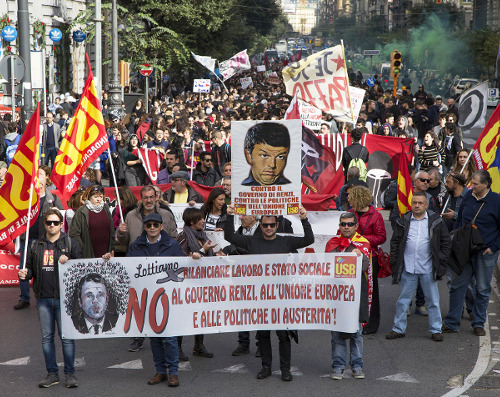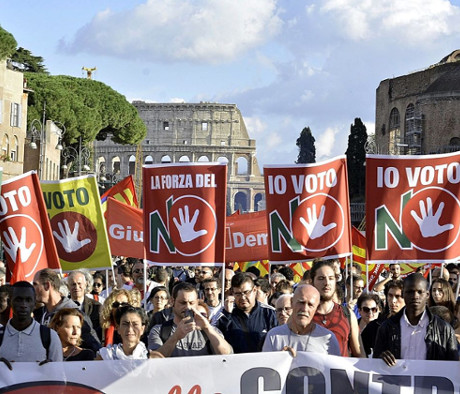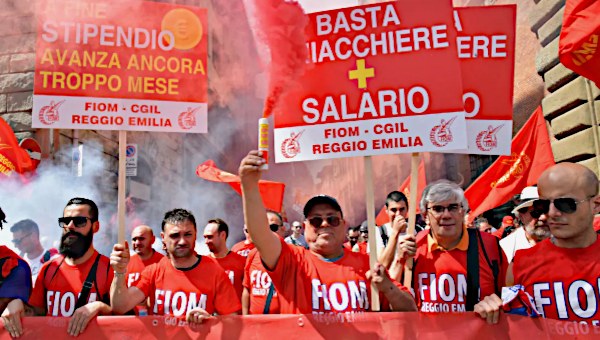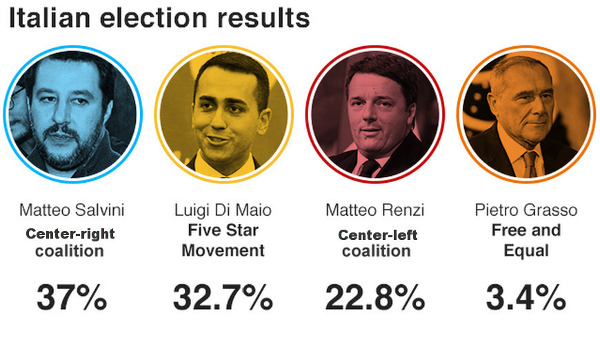Matteo Renzi’s recent attempt to constitutionally embed neoliberalism and simultaneously legitimize and secure his tenure as Prime Minister via a referendum on proposed changes to Italy’s postwar constitution failed spectacularly after sustained mobilization by ordinary Italians. Below are two short analyses of the outcome, as well as a longer article looking at the role referendums have played in Europe since the onset of the 2008 financial crisis.
The results of the referendum on the Italian constitution on December 4 confirms the capacity of civil society and movements to appropriate the institutions of direct democracy to advance progressive objectives. The extraordinary victory of “No” (almost 20 per cent more votes than “Yes”) and the unexpected increase in voter participation would not have been possible without the mobilization from below of thousands of people and social organizations. This is just one example of opportunities offered by referendums when seen as an instrument of “politics from below” that have taken place during these years of crisis.
The Great Recession that hit Europe in 2008 can be viewed as a turning point which has triggered not only socioeconomic transformations but also political changes. In countries most affected by the financial crisis, particularly Europe’s ‘periphery’, waves of protest have called into question the policies of austerity adopted by national governments under pressure from European and financial institutions – the EU, ECB and IMF in particular. These waves of protest – often referred to as the “Occupy” movement and the “Indignados” – have made apparent the crisis of legitimacy induced by the clear lack of responsibility on the part of political institutions toward the suffering of citizens. The protests have adopted different forms in different countries, influenced by specific developments and by the characteristics of the financial crisis, as well as by political opportunities specific to each nation and practical challenges for social movements. The protests have had immediate effects, and at times very deep, on party systems, causing not only the collapse of some traditionally dominant parties, but also the rapid (and unexpected) rise of “parties of movements.” This political upheaval has influenced not only local but also national and European elections. The social movements have taken advantage of opportunities offered by institutions of direct democracy, in particular via referendums which have been distinguished by political initiatives “from below.”
Referendums From Below
 Many of these “referendums from below” occurred in Europe during the Great Recession. Nationalism became a particular focus of debate, with the Scottish referendum on independence and with the pseudo-referendum on Catalan independence. Despite different institutional structures, these processes had various characteristics in common. Both cases have shown that late-neoliberalism has shattered the loyalty of citizens toward representative institutions at state level, but also that dissatisfaction has resulted in political activism rather than apathy. In particular, in both cases one observes a specific interaction between political elites and social movements that tried to take advantage of the referendum campaigns to advance their goals. The Scottish political elite convened the referendum and the movements appropriated the campaign, promoting their vision of a more just and democratic society. In Catalonia the social movements launched a campaign for self-determination and independence that involved institutional actors and political elites. The participation of movements in the referendum campaigns expanded the repertoire of political action and introduced new forms of organization.
Many of these “referendums from below” occurred in Europe during the Great Recession. Nationalism became a particular focus of debate, with the Scottish referendum on independence and with the pseudo-referendum on Catalan independence. Despite different institutional structures, these processes had various characteristics in common. Both cases have shown that late-neoliberalism has shattered the loyalty of citizens toward representative institutions at state level, but also that dissatisfaction has resulted in political activism rather than apathy. In particular, in both cases one observes a specific interaction between political elites and social movements that tried to take advantage of the referendum campaigns to advance their goals. The Scottish political elite convened the referendum and the movements appropriated the campaign, promoting their vision of a more just and democratic society. In Catalonia the social movements launched a campaign for self-determination and independence that involved institutional actors and political elites. The participation of movements in the referendum campaigns expanded the repertoire of political action and introduced new forms of organization.
During the same period in Europe, other referendums were launched by social movements who mobilized against austerity or had featured a strong mobilization from below with the goal of contesting neoliberal policies, as in the case of bank rescues (in Iceland), international agreements that impose austerity (in Greece), or the privatization of the water system (in Italy). In these cases the referendum campaigns assumed particular dynamics, with a strong participation “from below” and with a pivotal role by social movements and civil society.
In light of the political and social consequences of the Great Recession in Europe, referendums “from below” are of particular interest inasmuch as political initiatives are fostered by, or in any case, see a large mobilization on the part of civil society actors, various actors from traditional intermediary representative institutions (i.e. trade unions, political parties, churches and so on) or governments. On this terrain it is important to reflect on the connections between the dynamics of social movements and the practices of direct democracy; two questions that have often been considered separately, even within analyses on political conflict.
Abrogative referendums and initiatives launched via referendums from below are the most common forms of “referendums from below,” but our definition also covers referendum campaigns initiated by institutional actors that later featured a strong mobilization by movements; with a strong commitment to include citizens in deliberative processes and mass participation.
The studies on the referendums mentioned above indicate that within a referendum campaign and a social mobilization there is the noticeable strategic use of conceptual “frameworks” that define political conflict in a manner as to increase support for the movements. Given the frequent presence of coalitions of actors with different ideologies and diverse priorities, an appropriate choice of “frameworks” is very important in permitting diverse subjects to work together. Three main questions arise from a theoretical point of view.
Appropriate Frameworks: Three Questions
First, normative theories of democracy have emphasized the principle of equality regarding the ability to influence decision makers and autonomy in the capacity to shape opinions amongst citizens. As instruments of participation and, potentially, of deliberation, referendums can be considered to be consistent with the conceptions and practices of progressive social movements. Social movements must challenge existing institutions, producing cracks (or at least breakthroughs) in the system. The studies on one series of referendums have shown that their outcome tends to be, in reality, more open when compared to normal elections, and hence more influenced by developments within referendum campaigns. Nevertheless, their participatory and deliberative qualities, as their capacity to open new political opportunities, depend on institutional factors and on specific political processes, such as those promoted by social movements.
Formal and informal political opportunities influence the democratic quality of referendums and the possibilities that they will be characterized by initiatives “from below,” as conflicting political arenas. The formal institutional structure of a referendum influences the possibilities of using it to challenge the government and elites, yet each referendum presents specific political opportunities and constraints for actors “from below.” The sense of existing political opportunities also has an impact on the strategies of movements and on the commitment to develop participation and pluralism.
Second, the research on referendums underlines that the ways in which the question is termed has an important effect in determining the results of the referendum. Even if seemingly based on a single question, referendums often raise multiple demands, and parallel issues can be decisive in determining the results. Who determines the questions to be addressed is a matter which remains more open in referendum campaigns than in normal elections. In particular, our research shows the importance of the ability to link the questions at the centre of referendums with the more general issues addressed by the movements. These connections occur either on substantive contents (like dignity and equality), or also on the procedural level (like participatory and deliberative democracy). Moreover, when involving typical issues concerning social movements, referendums can have the effect of reinforcing the framework of the mobilizations, identifying the norms being discussed and the non-negotiable goals of the movements.
Third, the practices of direct democracy have shown that referendum campaigns are often not straightforward, in that they are influenced by contingent events that can have a large impact on public opinion. Social movements can perform a significant role in referendum campaigns inasmuch as they can introduce tipping points toward a politics of confrontation within conventional politics. Our research has shown how the use of repertoires of action by movements influences the dynamic of referendum campaigns, introducing, in particular, a procedural logic that expands the possibilities of participation by citizens even before achieving tangible legislative effects.
Donatella della Porta is professor of Sociology in the Department of Political and Social Sciences at the European University Institute, where she directs the centre on Social Movement Studies. This article is adopted from a forthcoming book Referendums from Below and was originally published on Sbilanciamoci website.
Renzi After the Deluge
Rossana Rossanda
Either me, or the deluge! With this slogan Matteo Renzi intensified the final two weeks of the electoral campaign. He had the deluge and now awaits investiture as the country’s saviour. It’s not that he didn’t know how to avoid the deluge: it was enough to defuse the most macroscopic attacks against elementary democratic common sense; begin an alteration to the electoral law “Italicum” according to the instructions of the constitutional court and give up on having an absolute parliamentary majority with thirty per cent of the vote. This would not have avoided all of the No votes, but a large part.
 He didn’t do it, not because he didn’t realize this. He wanted a confrontation and to demonstrate that there is no alternative to him. That this line and approach comes today from the secretary of the Partito Democratico (PD), heir to the Partito Comunista Italiano (PCI), is striking. It speaks of a prelude to a presidential party. It is a manner of catching adversaries both outside and inside the PD off guard.
He didn’t do it, not because he didn’t realize this. He wanted a confrontation and to demonstrate that there is no alternative to him. That this line and approach comes today from the secretary of the Partito Democratico (PD), heir to the Partito Comunista Italiano (PCI), is striking. It speaks of a prelude to a presidential party. It is a manner of catching adversaries both outside and inside the PD off guard.
What to do at this time? I believe the bull needs to be taken by the horns; adopt as soon as possible a new electoral law and then go to the polls as soon as possible. The new rules must be uniform for the Chamber of Deputies and the Senate, based upon proportionality, in order to have a clear picture of what the country has become, and, sadly, to start over. •
Rossana Rossanda is a journalist and leading figure of the Italian Left. Her memoir The Comrade from Milan is published by Verso. Original article was published on sbilanciamoci.info website.
Class Struggle Saved the Constitution
Giorgio Cremaschi
Analyses on the referendum are rampant, particularly with respect to the different political locations of the electorate, but to me the data that seems most obvious is the social distribution of the vote. The higher the income strata the more votes for Yes, the lower the more votes for No. This is the only constant figure for every part of the country. And the crushing victory for No shows that for once, the poorest and impoverished majority of the country did not get seduced by power and by the economic interests that power defends.
It has been decades that this power engages in class struggle from above, namely attacking and reducing rights and social equality in the name of the market and competitiveness. And often, thanks to cultural hegemony and media power, this same power succeeds in convincing the poor that change is in their interest, that is, to favour the rich.
This time in Italy, as in other countries lately, the game has not succeeded and the poor for a rare moment have won this round of class struggle.
‘Populism’ and Class Struggle
That which the bien-pensante press scandalously calls ‘populism’ is foremost this: the political rupture that ripens between the poor and those excluded from the expansion of globalization, whose numbers are always increasing. Unlike the past these signs of social protest do not find a correspondence on the official Left, it is solely an indication of the genetic modification of the latter. After decades of adaptation to liberal reformism it has become the expression of the victorious classes of global social selection.
Today the typical voter of the centre-left is the middle class professional who lives in the centre or on the hills surrounding the large cities. He is progressive on civil rights and reactionary on social ones, loves Europe, markets, the vibrant life of the new urban centres and thinks that his success is due solely to merit. This new middle class lies somewhere between the very rich who decide everything and those who aspire to reach this position. They make up the social bloc that has dominated the past thirty years of globalization, crushing and grinding the masses of the poor and the impoverished, workers, the unemployed and small businesses strangled by the banks.
Now, however, due to the continuing crisis this domination is starting to crack and even the complete control that the bourgeois social bloc exerts on the mass media and cultural production, even this is no longer enough. The poor are starting to rebel, returning to action as a people and differently from the past. They no longer encounter on their road that which has become the large part of the Left, which is losing its very historical purpose and due to this increasingly its own electoral clout.
In this way the terrain of modern class struggle – of the rebellion of the poor against social subjugation – is occupied by other forces; at times expressly those of the right, at others simply populist. But it is the Left that has withdrawn to the fashion shows in Milan’s Via Montenapoleone. Let’s leave this Left to its destiny and try to organize and speak for the class struggle of the poor as it today resumes to express and manifest itself. The struggle of the populist class that in Italy saved the constitution born in the Resistance.
Giorgio Cremaschi is a longtime trade union leader and activist who is now coordinator of Forum Diritti Lavoro. He tweets at @cremaschig. Original article was published on blog-micromega.blogautore.espresso.repubblica.it website.
Translations by Sam Putinja.





